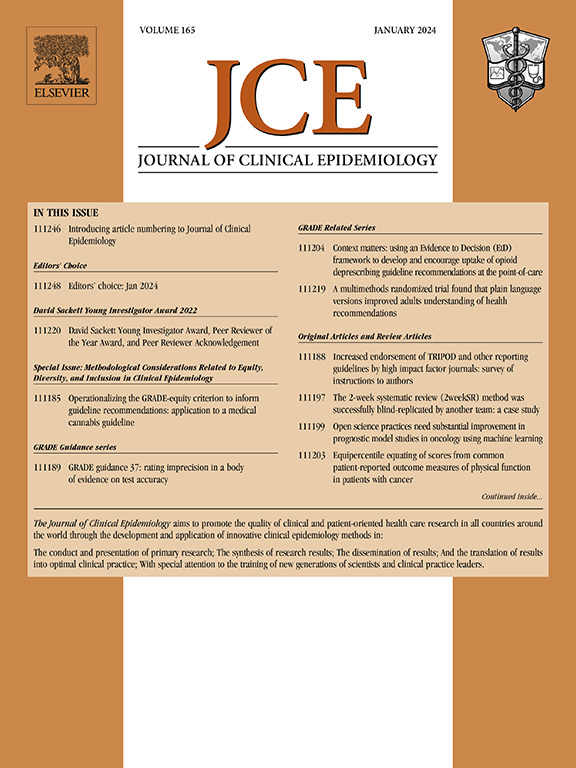为艾滋病毒感染者的纵向认知数据开发一种精细的协调方法。
IF 7.3
2区 医学
Q1 HEALTH CARE SCIENCES & SERVICES
引用次数: 0
摘要
目的:本研究的目的是开发一种改进的方法来协调几项大规模研究中HIV感染者(PWH)的纵向认知数据,在这些研究中,认知并发症是常见的,并且在表现上是不同的。研究设计和设置:我们开发了一种改进的方法来协调五项大规模PWH研究的纵向认知数据,这些研究使用不同的认知电池,只有一些重叠的测试-妇女跨机构艾滋病毒研究(WIHS),多中心艾滋病队列研究(MACS), CNS艾滋病毒抗逆转录病毒治疗效果研究(CHARTER),国家神经艾滋病组织联盟(NNTC)和艾滋病毒神经行为研究计划(HNRP)。使用潜在变量模型的传统数据协调方法侧重于横截面数据,并要求存在共同的认知测试作为“链接”评估。然而,缺乏对某些认知领域的通用测试可能会妨碍这些传统技术的直接应用。为了应对这些挑战,我们开发了一种利用二阶因子模型的协调方法,该模型利用了认知领域之间的结构关系。结果:我们的方法产生了统一的认知领域分数,这些分数在不同的队列中在人口统计学上是一致的,并且与原始或对数转换(例如,时间结果)的认知测试分数表现出很强的相关性。这些统一的分数准确地反映了年龄、教育状况和其他人口统计因素的变化,同时保留了参与者的纵向认知轨迹。结论:我们的协调方法对于未来分析大规模回顾性数据以了解PWH患者认知并发症的异质性至关重要。这些方法可用于协调具有相似度量的新数据集。本文章由计算机程序翻译,如有差异,请以英文原文为准。
Development of a refined harmonization approach for longitudinal cognitive data in people with HIV
Objectives
The aim of this study was to develop a refined method for harmonizing longitudinal cognitive data across several large-scale studies in people with HIV (PWH), in whom cognitive complications are common and heterogeneous in presentation.
Study Design and Setting
We developed a refined method for harmonizing longitudinal cognitive data across five large-scale studies in PWH that used different cognitive batteries with only some overlapping tests—Women's Interagency HIV Study (WIHS), Multicenter AIDS Cohort Study, CNS HIV Antiretroviral Therapy Effects Research (CHARTER), National NeuroAIDS Tissue Consortium, and the HIV Neurobehavioral Research Program. Traditional data harmonization methods using latent variable models focus on cross-sectional data and require the presence of common cognitive tests to serve as “linking” assessments. However, the absence of such common tests for certain cognitive domains can preclude the direct application of these traditional techniques. To address these challenges, we developed a harmonization method that leveraged a second-order factor model, which capitalized on the structural relationships among cognitive domains.
Results
Our approach yielded harmonized cognitive domain scores that are demographically consistent across different cohorts and exhibit strong correlations with the raw or log transformed (eg, timed outcomes) cognitive test scores. These harmonized scores accurately reflected variations according to age, educational status, and other demographic factors, while preserving participants’ longitudinal cognitive trajectories.
Conclusion
Our harmonization methods are essential for future analyses of large-scale, retrospective data to understand the heterogeneity in cognitive complications in PWH. These methods can be applied to harmonize new datasets with similar measures.
求助全文
通过发布文献求助,成功后即可免费获取论文全文。
去求助
来源期刊

Journal of Clinical Epidemiology
医学-公共卫生、环境卫生与职业卫生
CiteScore
12.00
自引率
6.90%
发文量
320
审稿时长
44 days
期刊介绍:
The Journal of Clinical Epidemiology strives to enhance the quality of clinical and patient-oriented healthcare research by advancing and applying innovative methods in conducting, presenting, synthesizing, disseminating, and translating research results into optimal clinical practice. Special emphasis is placed on training new generations of scientists and clinical practice leaders.
 求助内容:
求助内容: 应助结果提醒方式:
应助结果提醒方式:


